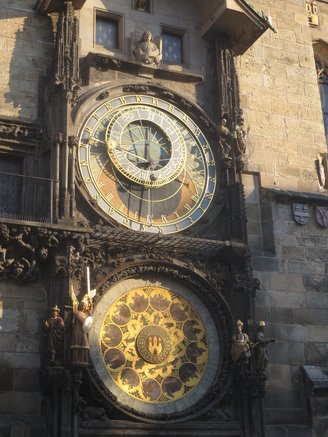“Last time I saw you, you led a hike here four years ago,” I said to the deep-tanned gringo who was guiding a walk to a remote beach on Mexico’s Pacific shore.
“Yeah, I remember you! Time sure flies, doesn’t it?”
I paused, not wanting to argue, but…
“No, it seems an eon ago to me,” I finally said.
That’s the thing about time. One man’s moment is another’s age. What does it mean to say, “That seems like a lifetime ago,” when to the other, it feels like yesterday? We know what objective time is, that which we read from a clock, or on the calendar. I was born 28,955 days ago, Siri tells me, so it must be true. Another couple of years I’ll be thirty thousand days old. Jeezus. Feels like a lifetime.

Objective time is what you read from a clock. This is the world’s oldest working clock, Prague’s Orloj, originally installed in 1410. Photo: Barry Evans.
So, subjective time, which is all over the place. Everyone has had, if not their whole life passing before their eyes in a moment of stress or fear, at least the sense that time passed really, really slowly. Jumping out of a plane, my first parachute jump. Rolling a car after too many beers. Stuck on a crumbling rock face, scared to go up or down. You must have had something like that happen when time—at least in retrospect—went really slowly. Or maybe just some mundane event, like having a tooth filled? C’mon, get it over, feels I’ve been in this dentist’s chair for hours! (Whatever happened to nitrous?!)
Scientists, wouldn’t you know, have been studying this for years. “Time dilation” is a well known effect. “Fear prompts a state of arousal in the amygdala which increases the rate of a hypothesized internal clock,” says Wikipedia. Makes sense. When you’re in a threatening situation, you want to have “time” to consider your options, not just react blindly. Put yourself in the shoes of your distant ancestor. Instead of running from the sabertooth (which, let’s face it, you aren’t going to out-run in a million years), you might be better off facing the threat down. Or climbing a tree. Or throwing a rock. Or asking Scotty to beam you up. Probably anything’s better than the instinct to turn and run.
Which (finally) gets to my particular interest, age-related perception of time: the sense that time goes by faster now when we were young. Why? Because (according to neurologists) dopamine levels drop with age. And the less dopamine in your brain, the more likely you are to underestimate a given interval of time—what used to feel like a year now feels like six months. That’s biochemistry, and there’s not much we can do about that: “That which we are, we are.”
What we can do is to keep the novelty alive by filling our lives with new experiences, spinning out our days with events to make time seem to pass more slowly and deliberately. Problem is, the older we get, the harder it is to find novelty when the cynical “been there, done that” syndrome has taken over from kids’ “every experience is new.” At some point in our lives, we already know what a mojito tastes like, the velvet smoothness of our lover’s skin, what it’s like to walk on snow, how we’ll feel on seeing the glow of the Milky Way in the southern sky. “Neural adaption” they call it: we barely notice stuff that once would have thrilled us. We’ve adapted to wonder.
Me, I won’t give up wonder without a fight. (Screw those dopamine levels.) Hang out with young folks (vicariously experiencing their novelty), travel to new shores, get lost, brave the breakers, write every day, rise early, keep questioning, emulate Ulysses and his crew: “…hearts made weak by time and fate, but strong in will/ To strive, to seek, to find, and not to yield.”
CLICK TO MANAGE